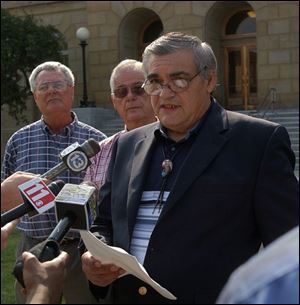
Tribe sues to acquire state land on North Bass
7/1/2005
Second Chief Larry Angelo discusses the federal lawsuit filed by the Ottawa Tribe of Oklahoma, as Bert Kleiden, secretary of council, left, and Chief Charles Todd look on.
An Oklahoma-based Native American tribe whose ancestral roots lie in northwest Ohio yesterday filed the first of two lawsuits in federal court related to its claim to state-owned land on North Bass Island in Lake Erie.
The Ottawa Tribe of Oklahoma claims a treaty it made with the federal government 200 years ago provides the tribe with unrestricted fishing and hunting rights. The tribe is seeking recognition from the state for those rights that would allow it to establish a commercial fishery on North Bass Island.
Richard Rogovin, the Columbus attorney who filed the lawsuit in U.S. District Court, said a second lawsuit would be filed later this year in an attempt to pursue the tribe's property rights to about 300 acres on the northern half of the island.
The tribe claims the land was not among property that was relinquished to the federal government with the signing of the Treaty of Fort Industry on July 4, 1805, and that the Ottawas retained ownership of the property when the Canadian border was moved north of the island in 1822.
"We believe the land is rightfully ours, and we have the opinion of several experts to prove that," Larry Angelo, second chief of the Ottawas, said during a news conference outside the federal courthouse.
Mr. Angelo was joined by Chief Charles A. Todd and Bert Kleiden, who is the tribe's secretary of council, in making the announcement about litigation issues. The tribe numbers about 2,000 nationally.
Mr. Angelo said the tribe has no specific plans for the land but potential uses could include land leases, a tourist attraction, or condominiums. He said casino gambling is not being considered.
"No treaty was ever made with respect to this portion of the island. The Ottawas never ceded their rights to the northern half of North Bass Island, and therefore they are the rightful owners of this prop-erty," Mr. Rogovin said.
The property eyed by the tribe was purchased by the state in 2003 for $17.4 million from Cleveland's Paramount Distillers and so far is undeveloped. Mr. Rogovin said the tribe was not making a claim to any private property on the island.
After leaving Toledo, the tribe leaders and their attorneys drove to Port Clinton, where they took a boat and went to North Bass to tour the undeveloped state land.
Ohio Attorney General Jim Petro said he doesn't see any merit in the Ottawas' claims, and predicted the suit likely would be rejected because there was no evidence that the Ottawas inhabited or controlled the island.
"We met with representatives of the Ottawa Tribe in January and in June of this year. We reviewed their land and fishing claims, and we disagree. We will continue to defend the state against these false assertions," he said.
The attorney general cited a recent ruling by the 2nd U.S. Circuit of Court of Appeals that overturned a $247 million judgment to Indian tribes that claimed New York state obtained land illegally.
If successful in obtaining fishing rights, the tribe would begin gill-net fishing in Lake Erie, an operation that could produce 2,000 tons of fish annually. The tribe plans to use revenue generated from the operation to pay for legal expenses related to the land claims.
The lawsuit was the second claim made by a Native American tribe in federal court this week.
The Eastern Shawnee tribe, which also is based in Oklahoma, sued the state in federal court in Toledo to seek recognition of ownership of lands in southern Ohio. The lawsuit is seen as an attempt to force negotiations over Indian casinos.